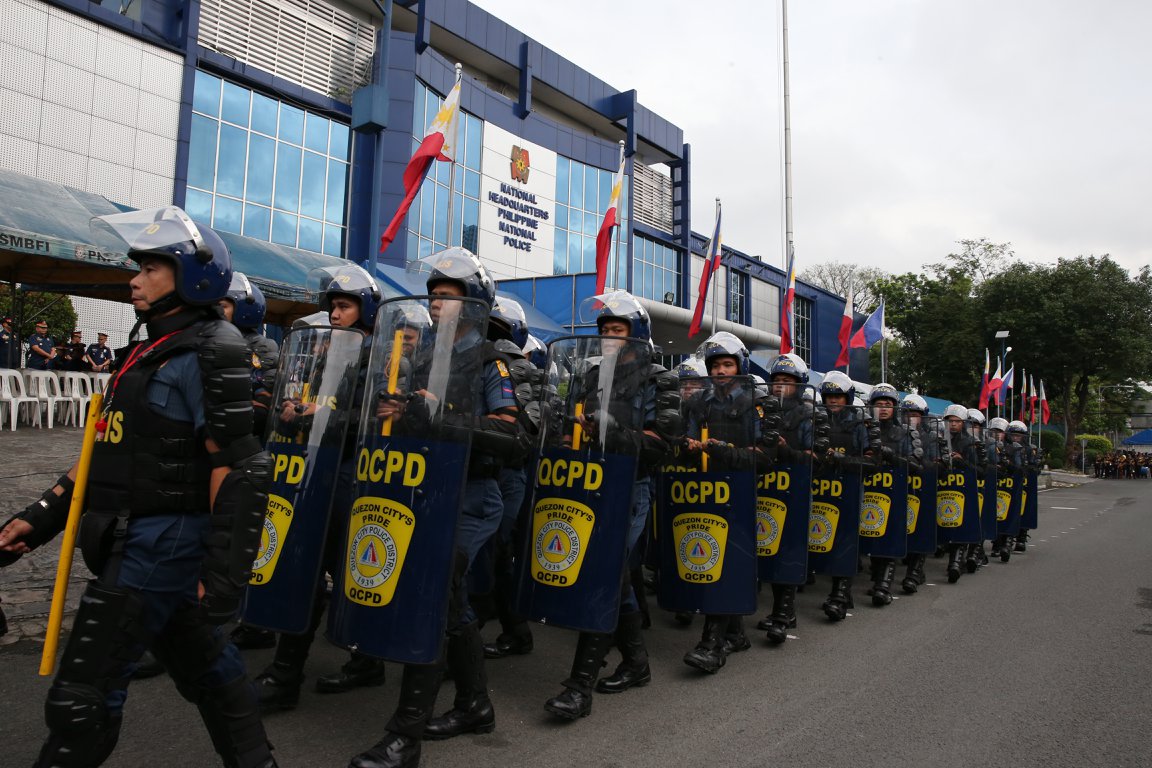Headline
HRW asks PNP to stop anti-tambay campaign

Quezon City Police District personnel showcased their operational readiness, equipage, competency and capability in a skills demonstration held during the Monday Flag raising ceremony on June 25, 2018 in Camp Crame, Quezon City. (Photo: Philippine National Police/Facebook)
MANILA, Philippines — The Human Rights Watch (HRW) on Tuesday, June 26, called on the Philippine National Police (PNP) to “immediately end” its anti-loitering policy.
Phelim Kine, deputy director in HRW’s Asia Division, said that the PNP’s ‘crime prevention’ campaign is targeted at “low-income Filipinos,” the same group of people whose communities have been “terrorized” by the police’s war on drugs.
“The Philippine National Police are again demonstrating their preference for wielding fear, intimidation, and arbitrary arrest to target vulnerable communities rather than respect for the rule of law,” Kine said.
According to the HRW, the arrestees are typically “not brought before a judge, but detained for a period and then released, though sometimes criminal charges are brought.”
The rights watchdog also raised concerns on the “poor and inhumane health and hygiene conditions” of the “grossly overcrowded detention centers” where the arrested tambays (loiterers) are brought.
“Overcrowding of Philippine jails has long made them hazardous to detainees’ health because of inadequate food, ventilation, health care, and toilet facilities,” the HRW said.
“As a result, pulmonary illnesses such as tuberculosis, skin infections, diarrhea, and sepsis run rampant among detainees,” it added.
The HRW also cited the alleged prevalence of “torture and other forms of ill-treatment” in the country’s detention centers, noting the case of Genesis “Tisoy” Agoncillo, a “loitering” suspect who died while in the custody of the Quezon City Police District (QCPD).
The QCPD initially said that Agoncillo died after experiencing difficulty in breathing. His death certificate, however, showed the presence of “multiple blunt force trauma” in his “neck, head, chest, and upper extremities,” indicating foul play.
The HRW further argued that the anti-loitering policy is “arbitrarily ensnaring Filipinos who are lawfully on the streets at night,” citing the complaints of two call center agents who were arrested and detained in a Makati police station for standing outside their friend’s residence. They remained in custody for an hour but were eventually released.
These types of arrests, the HRW said, evoke “memories of arbitrary police targeting of the urban poor during the 1972-1981 martial law period under the late President Ferdinand Marcos.”
“The Philippine government should protect the basic rights of all Filipinos rather than let the police demolish them on the pretext of a ‘crime prevention’ campaign,” the rights watchdog said.
The crackdown against loiterers followed after President Rodrigo Duterte on June 13 told the PNP to be strict in its policy against loiterers.
“Ang mga criminals dapat diyan, ang mga durugista (The criminals and drug addicts), they are not supposed to be there [on the streets]. So my directive is ‘pag mag-istambay-istambay diyan sa, sabihin niyo, ‘Umuwi kayo. Kay ‘pag hindi kayo umuwi ihatid ko kayo doon sa opisina ni ano — Pasig [River] (‘if there are people loitering there, tell them, ‘Go home. If you won’t, I will bring you to the Office of the President), he said.
The President on June 20 clarified that he did not order the arrest of any loiterers but simply expressed his disapproval of loitering.
“Wala namang inaaresto (No one is being arrested). I just don’t want you using the streets to loiter,” Duterte said in his speech in Iloilo City.
He, however, changed his tune today, June 26, by saying that the police can arrest loitering minors, and defended that the police’s anti-loitering campaign is legal.
“That to me is legal, until the Supreme Court says it is illegal. Until the Supreme Court says they cannot do it. I am now invoking the police power of the state to establish order, safety [and] that is not subject to a legislation,” he said.
“You take them into custody not to arrest them, but for their own safety, to protect them. We are removing the minors, take them into custody, tawagin mo yang DSW(D) diyan, pati yung (call the DSWD there, including the) barangay. You take care…sabi ni Mayor, paarestuhin ‘yan (the Mayor said, arrest them) for their own protection. They are not being arrested for any crime, it’s for their own good that they are arrested,” Duterte added.





















